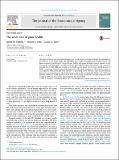The asset cost of poor health
Author(s)
Venti, Steven F.; Wise, David A.; Poterba, James Michael
Download1-s2.0-S2212828X16300020-main.pdf (1.210Mb)
PUBLISHER_CC
Publisher with Creative Commons License
Creative Commons Attribution
Terms of use
Metadata
Show full item recordAbstract
This paper examines the correlation between poor health and the evolution of wealth for households in the first nine waves of the Health and Retirement Survey (HRS). It complements previous studies that have enumerated specific financial costs of poor health, such as out of pocket medical expenses or lost earnings. Because poor health can affect wealth accumulation through several channels, the “asset cost” measure can provide additional insight on the health-wealth nexus. We develop a simple measure of health status based on the first principal component of HRS survey responses on self-reported health status, diagnoses, ADLs, IADLs, and other indicators of underlying health. We find a large and substantively important correlation between this health measure and wealth accumulation. Within each 1994 asset quintile, individuals in the top third of the 1994 health status distribution averaged 50 percent more wealth in 2010 than those in the bottom third of that distribution.
Date issued
2017-06Department
Massachusetts Institute of Technology. Department of EconomicsJournal
Journal of the Economics of Ageing
Publisher
Elsevier
Citation
Poterba, James M., Steven F. Venti, and David A. Wise. “The Asset Cost of Poor Health.” The Journal of the Economics of Ageing 9 (June 2017): 172–184.
Version: Final published version
ISSN
2212-828X